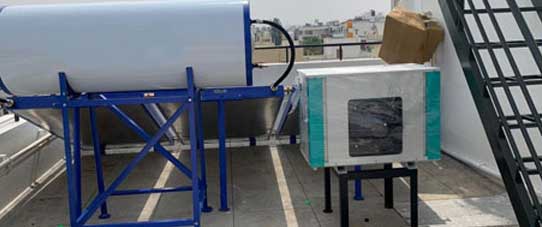Efficient Hot Water, Powered by Choice
Description:
A heat pump water heater (HPWH) is an energy-efficient technology that uses the principles of a heat pump to heat water for domestic and commercial use. It extracts heat from the surrounding air and transfers it to the water in the storage tank. Heat Pumps are commonly used for residential and commercial water heating applications.

With Solar
Advantages
- Higher Efficiency: When coupled with solar panels, the electricity required to power the heat pump can be sourced from renewable solar energy, making the entire system more energy-efficient and environmentally friendly.
- Energy Savings: Solar-powered HPWHs reduce reliance on conventional electricity sources, leading to lower energy bills and potential savings over time.
- Carbon Footprint Reduction: The combination of a heat pump and solar panels significantly reduces greenhouse gas emissions, contributing to a greener and more sustainable energy solution.
- Energy Independence: The use of solar energy for both the heat pump and water heater enhances self-sufficiency and reduces dependence on the grid.
Disadvantages
- Higher Initial Cost: The upfront investment for both a HPWH and solar panels can be higher compared to conventional water heaters.
- Intermittent Solar Output: Solar energy availability may vary due to weather conditions and time of day, affecting the heat pump’s performance.
- System Complexity: Integrating a heat pump water heater with solar panels requires careful system design, installation, and maintenance.
Without Solar
Advantages
- Efficiency: Even without solar panels, HPWHs are generally more efficient than traditional electric resistance water heaters, resulting in energy savings.
- Energy Savings: HPWHs consume less electricity compared to standard electric water heaters, leading to reduced energy bills.
- Environmental Impact: While not as environmentally friendly as when paired with solar, HPWHs still produce fewer greenhouse gas emissions compared to fossil fuel-based water heaters.
Disadvantages
- Higher Upfront Cost: The initial cost of a HPWH is generally higher than that of conventional electric water heaters.
- Electricity Dependency: Without solar panels, the HPWH relies on grid electricity, which may still be partially sourced from non-renewable sources.
- Limited Renewable Energy: Without solar integration, the HPWH does not harness renewable energy directly for its operation.
Conclusion
A HPWH combined with solar panels offers a highly efficient and eco-friendly solution for water heating. It reduces energy consumption, lowers utility bills, and minimizes environmental impact. While the initial investment may be higher, the long-term benefits in terms of energy savings, reduced carbon footprint, and increased energy independence can outweigh the costs.
Selecting the right heat pump water heater, with or without solar integration, depends on your specific requirements. Our team will assist you in making the most cost-effective and sustainable choice.
